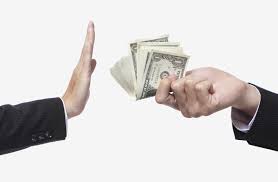The Microeconomic Perspective on Bribery Incentives
 I always enjoyed economics – understanding “rational” behavior and applying it to business situations can be very productive. Of course, there were many detractors who argued that economics is filled with assumptions that take the discipline away from reality, but I find those arguments unpersuasive.
I always enjoyed economics – understanding “rational” behavior and applying it to business situations can be very productive. Of course, there were many detractors who argued that economics is filled with assumptions that take the discipline away from reality, but I find those arguments unpersuasive.
There has been a fair amount of research on corruption and the impact that bribery has on a functioning market. My suggestion on research is to focus even more on the incentives that companies and individuals have to engage in bribery.
Starting at the company level, there is a common sense notion that bribery does not “grease the bureaucratic wheels” but may in fact be counterproductive. Research by Daniel Kaufman and Shang-Jin Wei found that bribery actually hinders rather than accelerating commerce. (Here).
Kaufman and Wei conclude that saying no to bribery does in fact make rational sense.
Collective action against bribery is even more effective in demonstrating the economic advantage to rejecting bribery demands. Kaufman and Wei were able to show that companies that paying bribes creates perverse incentives for bureaucrats and government officials to expand red tape and hurdles in order to cash in on additional bribery payments. To counter that incentive, companies that say no to bribery will actually reduce bureaucratic incentives to seek bribes from companies.
Phillip Nichols from the University of Pennsylvania (Go Quakers, my alma mater) has written extensively on the successes that western companies have had by not paying bribes in emerging markets. (Here)
The bottom line for companies is that saying no to bribery makes ethical and rational economic sense. Of course, there are situations where companies find that individual actions may justify bribery in their mind. It is estimated that at least one third of all global companies frequently pay bribes. Increased enforcement of anti-corruption laws creates additional costs for companies to weigh in the bribery calculation. For that reason, enhanced enforcement as promoted by the OECD foreign bribery convention is a positive force for reducing corruption in many important OECD countries.
Another important incentive for companies is to avoid the reputational “cost” inflicted when a company is charged with bribery violations. Many corporate leaders, if asked, will admit that the financial penalty is less punitive than the reputational harm to the company and its stakeholders.
Legal enforcement, however, will not eliminate nor contain the problem unless there is a real local commitment in each country to enforce domestic laws against bribery. It is one thing to prosecute US companies for paying bribes overseas but it is quite another to prosecute the bribe recipients in the government that accepted the bribes. Without a dual enforcement scheme, the focus on the foreign actor will inevitably dilute the impact of bribery enforcement programs.
 More research and education needs to be advanced on the issues surrounding incentives and costs and the “rational” decision to pay bribes. Corporate actors operate in a world of incentives and need to be educated on important considerations when making “rational” decisions.
More research and education needs to be advanced on the issues surrounding incentives and costs and the “rational” decision to pay bribes. Corporate actors operate in a world of incentives and need to be educated on important considerations when making “rational” decisions.
Life is an equation filled with cost-benefit decisions. As the corporate “cost” of bribery increases, any potential benefits to a company will diminish in return. When economic and ethical incentives align, a company will reap significant benefits from avoiding bribery.
















Nice post. We found the same in our studies in Vietnam. Firms that were not bribing were doing better. Learning rules and adhering to them, like any investment, may be costly initially, but pays off in the long run.